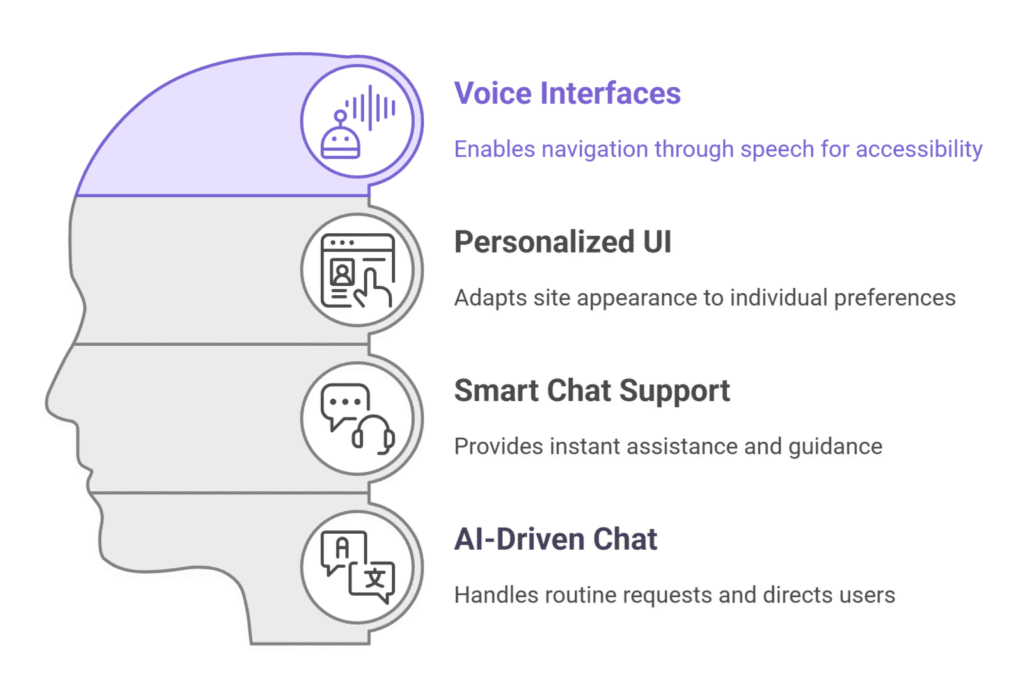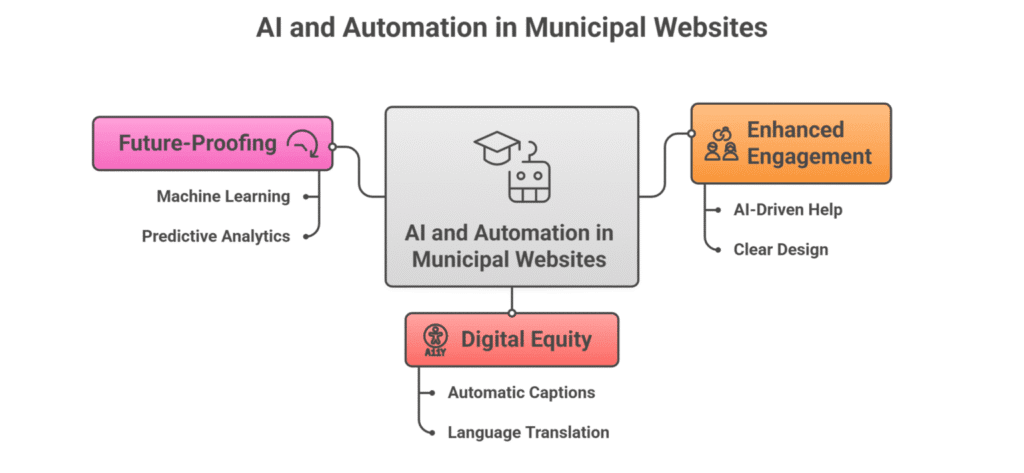
How Future Accessible Municipal Websites May Be Shaped by AI and Automation
Municipal websites are evolving into dynamic, user-centric portals as AI and automation technologies become more prevalent. Modern municipal website development must focus on inclusivity and efficiency, addressing diverse resident needs while keeping up with Government Technology Trends. Industry reports indicate that over half of local government leaders expect AI to significantly impact their operations, even though only about 29% are using AI tools today. By embracing these innovations now, cities can create more inclusive online experiences that serve all residents.
AI-Powered Accessibility and Personalization
Leading-edge AI features make municipal sites more accessible and engaging. For example, voice-activated navigation lets users control the website with spoken commands. Intelligent personalization can automatically adjust font sizes, layouts, and color contrasts to match individual preferences. And AI chatbots and virtual assistants offer 24/7 support, answering questions and guiding citizens through processes in real-time. These tools not only empower users with disabilities, but also make everyone’s experience smoother. For instance:
- Voice Interfaces: AI-driven voice recognition allows visually impaired or motor-challenged residents to navigate the site by speech, reducing barriers.
- Personalized UI: Intelligent systems can dynamically adapt site appearance changing font size, color contrast, or layout to suit each user’s needs.
- Smart Chat Support: AI chatbots respond instantly to inquiries (FAQ or complex forms), giving residents help any time of day. This responsiveness builds citizen engagement by making information easier to find and reducing frustration.

Beyond static features, AI-driven chat and assistant services are transforming how people interact with local government online. Integrated chatbots can immediately handle routine requests and direct users to the right resources, which studies show keeps citizens on the site longer and boosts satisfaction. By having intelligent helpers on the site, municipalities demonstrate responsiveness and respect for citizens’ time, reinforcing trust in government.
Automation Streamlining Municipal Services
Automation in public sector websites further enhances efficiency and accuracy. Modern content management systems can automatically update information (e.g. event calendars, news, permits) in real-time, so residents always see current data. According to one municipal tech report, over 50% of agencies still rely on manual methods like emailed documents to publish site updates, causing delays. Adopting automated workflows solves this by immediately pushing changes live without human intervention. Automation also simplifies tasks such as service requests or permit applications: forms can trigger automated reviews and notifications, cutting down processing time and staff workload. Key benefits include:
- Real-Time Updates: Automated CMS tools keep content fresh (e.g. emergency alerts, meeting notices) without manual edits.
- Streamlined Transactions: Automation handles repetitive tasks (data entry, approvals, payments), letting staff focus on higher-value work.
- Continuous Compliance: Automated checks and monitoring can flag accessibility or policy issues immediately, helping sites meet WCAG/ADA standards at all times.
By embracing these automation in public sector advances, cities make their websites more reliable and reduce human errors. The message is clear from recent research: the time to implement automation is now to keep up with user expectations.
Mobile-First and Responsive Design
Today’s residents expect government information on the go, so responsive design for government websites is essential. In fact, about 97% of Americans own a cellphone and roughly 15% rely solely on smartphones for Internet access. Mobile-only users often include younger, lower-income, and rural residents. If a city’s site isn’t mobile-optimized, it effectively shuts these groups out of services. Responsive design ensures web pages automatically adapt to any screen size, providing legible layouts and easy navigation on phones or tablets. This is not just a convenience Google now uses mobile-first indexing, meaning a responsive site ranks better in search results. Key mobile-first strategies include:
- Mobile Optimization: Prioritize fast load times and touch-friendly interfaces so citizens can quickly complete tasks (pay bills, report issues) from their phones.
- Responsive Layout: Structure content blocks (collapsible sections, sticky navigation) to fit any device, avoiding pinch-zoom or horizontal scroll for users.
- Integrated Mobile Apps: Many cities pair their websites with Municipality-Branded Mobile Apps that mirror the site’s design and services. These apps (leveraging the same data and AI features) keep the experience consistent, strengthening the city’s digital brand and reach.
Making sites mobile-first also aligns with accessibility: it means ensuring elements like buttons and forms work well for touch and are screen-reader friendly. In emergencies, a fully responsive, accessible site can make life-saving information available to anyone with a phone.
Citizen Engagement and Digital Transformation
Ultimately, AI and automation on municipal websites aim to improve citizen engagement and support public sector digital transformation. By reducing friction and tailoring services, residents find what they need more easily and feel respected by their government. Research has shown that citizens rate agencies higher when online services are easy to use. In other words, every frictionless interaction builds public trust. These tech trends also help bridge the digital divide one report notes that, AI and automation could bridge the digital divide, ensuring all residents have equal access to essential services.
In practice, this means crafting sites that answer common user questions immediately, flag potential accessibility gaps automatically, and invite feedback. Analytics can then guide continuous improvement. By focusing on AI tools, automation, and data-driven design, local governments can create more accessible, efficient, and impactful websites that meet the needs of their communities. These efforts are a core part of broader public sector digital transformation, positioning a city at the forefront of modern governance and aligning with leading government technology trends.
- Enhanced Engagement: AI-driven help and clear, responsive design make online services user-friendly. When information is easy to find and use, residents interact more often and provide better feedback.
- Digital Equity: Features like automatic captions, language translation, and voice control ensure all residents including those with disabilities or language barriers can access services.
- Future-Proofing: Embracing machine learning and automation today lays the groundwork for tomorrow’s innovations (e.g. predictive analytics, smarter search). Municipalities that lead with tech set a benchmark for others to follow.

These strategies also directly boost citizen engagement and satisfaction. For example, integrating appointment scheduling or service request forms with AI-driven support means residents spend less time navigating bureaucracy and more time getting things done. Each smooth transaction reinforces that public service should meet people where they are, whether on a smartphone at midnight or through a voice query in their home.
Preparing for the Future
The future of municipal website development is being written now. City IT leaders, CIOs, and digital transformation officers must plan strategically to integrate these capabilities. That means choosing development partners and municipal website developers who understand accessibility standards and AI tools alike. It also means investing in infrastructure (secure cloud hosting, fast networks) and training staff to use new platforms.
Getting started might involve small steps: implementing an AI chatbot on a pilot page, or running an accessibility audit powered by automated tools. Each successful deployment builds internal confidence to tackle bigger initiatives. Over time, these innovations will blend into the standard toolkit for any forward-thinking local government. As one industry benchmark emphasizes, cities that focus on AI, automation, and data-driven strategies will have the most accessible and efficient websites for years to come.
Municipal officials can also look to peer projects for inspiration: many cities are already experimenting with machine learning to streamline permit approvals, or using responsive design systems and style guides (like the U.S. Web Design System) to standardize their sites. Tracking Government Technology Trends and participating in collaborative forums will help ensure you’re ready to adopt new solutions as they emerge.
In summary, by leveraging AI and automation, municipalities can transform their websites from static information portals into inclusive digital service hubs. These tools help meet legal accessibility requirements while also delivering a superior experience that increases citizen engagement and trust. For IT directors and CIOs tasked with digital transformation, the time is now to explore these options and plan for a future-ready web presence.
Ready to take your municipal website to the next level? Contact our team of experts to learn how AI-driven accessibility and automated workflows can modernize your city’s online services and better engage your community.
Frequently Asked Questions
How is AI transforming government websites?
AI in government websites improves accessibility and user experience through chatbots, voice navigation, and personalized content. App Maisters integrates AI features that help municipalities deliver faster, smarter, and more inclusive online services.
What role does automation play in the public sector?
Automation in the public sector streamlines workflows like service requests, form submissions, and content updates. App Maisters builds automated solutions that reduce staff workload while improving service delivery for citizens.
Why is responsive design important for government websites?
Responsive design in government websites ensures that citizens can access information seamlessly from any device. App Maisters develops mobile-first, WCAG-compliant websites that improve usability and strengthen digital inclusion.
How do AI and automation improve citizen engagement?
AI chatbots, automated notifications, and personalized dashboards allow residents to get quick answers and updates. These tools from App Maisters make communication efficient, improving transparency and citizen engagement across municipalities.
How can municipalities ensure website accessibility compliance?
Municipalities can achieve ADA and WCAG compliance through AI-driven accessibility tools and continuous testing. App Maisters specializes in accessible municipal website development, ensuring every citizen can access digital services equally.
What are the latest Government Technology Trends in web development?
Current Government Technology Trends include automation, AI-driven analytics, cloud hosting, and mobile-first design. App Maisters helps public agencies adopt these innovations for a smoother digital transformation journey.
How do Municipality-Branded Mobile Apps support digital transformation?
Municipality-Branded Mobile Apps extend website services to mobile users, improving engagement and convenience. App Maisters creates mobile apps that connect seamlessly with web platforms for complete public sector digital transformation.
Why should governments partner with App Maisters for digital solutions?
App Maisters provides end-to-end municipal website development with AI integration, automation, and responsive design. Our certified team delivers secure, scalable digital solutions for government agencies and the wider public sector.






